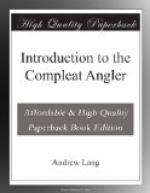To him, if we may say so, it was easy to be saved, while Bunyan, a greater humorist, could be saved only in following a path that skirted madness, and ‘as by fire.’ To Bunyan, Walton would have seemed a figure like his own Ignorance; a pilgrim who never stuck in the Slough of Despond, nor met Apollyon in the Valley of the Shadow, nor was captive in Doubting Castle, nor stoned in Vanity Fair. And of Bunyan, Walton would have said that he was among those Nonconformists who ’might be sincere, well-meaning men, whose indiscreet zeal might be so like charity, as thereby to cover a multitude of errors.’ To Walton there seemed spiritual solace in remembering ’that we have comforted and been helpful to a dejected or distressed family.’ Bunyan would have regarded this belief as a heresy, and (theoretically) charitable deeds ’as filthy rags.’ Differently constituted, these excellent men accepted religion in different ways. Christian bows beneath a burden of sin; Piscator beneath a basket of trout. Let us be grateful for the diversities of human nature, and the dissimilar paths which lead Piscator and Christian alike to the City not built with hands. Both were seekers for a City which to have sought through life, in patience, honesty, loyalty, and love, is to have found it. Of Walton’s book we may say:—
’Laudis amore tumes?
Sunt certa piacula quae te
Ter pure lecto poterunt recreare
libello.’
WALTON AS A BIOGRAPHER
It was probably by his Lives, rather than, in the first instance, by his Angler, that Walton won the liking of Dr. Johnson, whence came his literary resurrection. It is true that Moses Browne and Hawkins, both friends of Johnson’s, edited The Compleat Angler before 1775-1776, when we find Dr. Home of Magdalene, Oxford, contemplating a ‘benoted’ edition of the Lives, by Johnson’s advice. But the Walton of the Lives is, rather than the Walton of the Angler, the man after Johnson’s own heart. The Angler is ‘a picture of my own disposition’ on holidays. The Lives display the same disposition in serious moods, and in face of the eternal problems of man’s life in society. Johnson, we know, was very fond of biography, had thought much on the subject, and, as Boswell notes, ‘varied from himself in talk,’ when he discussed the




